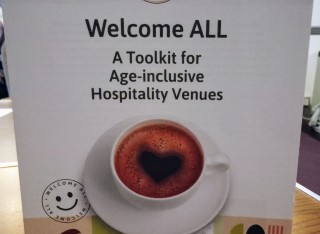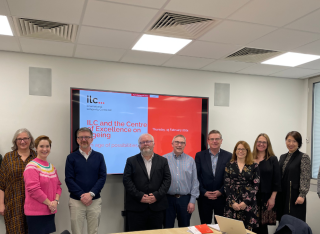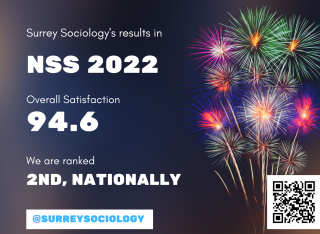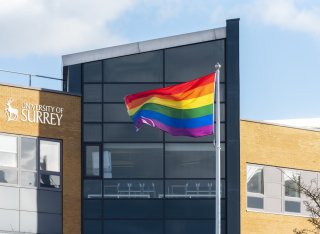
Professor Andrew King
Academic and research departments
Sociology, Centre of Excellence on Ageing, Centre for Research on Ageing and Generations.About
Biography
I am Associate Dean (Doctoral College) for the Faculty of Arts, Business and Social Sciences (FABSS). Between July 2021 and March 2025 I was Head of Sociology. I am Co-Director of the Centre of Excellence on Ageing (CEA) and former founding Co-Chair of SGS (the Sex, Gender and Sexualities Research Group at Surrey). I lead the University of Surrey Economic and Social Research Council Impact Acceleration Account.
I have been recognised for my excellence in both research and teaching. In 2018 I received the Vice-Chancellor's Award for Research Excellence and I received the Vice-Chancellor's Award for Teaching Excellence in 2014. I am a Senior Fellow of the Higher Education Academy.
I am currently Deputy Editor of the journal, Ageing and Society and a Co-Editor of Sociology, the journal of the British Sociological Association.
During 2023/4 I was a Visiting Professor in Equality, Diversity and Inclusion at Trinity College Dublin.
University roles and responsibilities
- Associate Dean (Doctoral College) FABSS
News
ResearchResearch interests
My research spans social gerontology and the sociology of ageing; gender and sexualities across the life course and methodology, particularly mixed methods, participatory methods and qualitative methods.
I currently lead a project on LGBTQ+ inclusivity in estate agency and private lettings, working in collaboration with Propertymark. I am also a co-investigator of the Life House Project which is exploring the use of theatre in facilitating older LGBTQ+ people to tell their stories and concerns about housing later in life. Between 2018-2021 I led the CILIA-LGBTQI+ project, part of the DIAL programme funded by the Norface Network. This large, comparative European project compared intersectional life course inequalities amongst LGBTQI+ people in four European countries. The project used a variety of quantitative and qualitative methods, including secondary analysis of surveys, new qualitative data and agent-based modelling (ABM). Following up on this project, I worked with Surrey colleagues on a project to explore intergenerational exchanges and dialogues in LGBTQ+ communities.
I have expertise in housing issues amongst LGBTQ+ people and have conducted a number of studies over the past ten years. These include two linked impact projects: 'Housing with Pride' (2019-2020) and 'Housing with Pride' (2021-2023). These projects were collaborations between the University of Surrey, HouseProud and Stonewall Housing, along with housing associations, the Greater London Authority and Tonic Housing. They built on research I led called HomeSAFE - which was the UK's largest study about LGBTQ+ social housing residents and a Pledge Scheme we developed with social housing providers, HouseProud, Stonewall, Stonewall Housing, the Greater London Authority and most importantly LGBTQ+ social housing residents. Nearly two million social housing residents live in homes covered by providers who signed the Pledge Scheme.
I was also Principal Investigator on the SAFE Housing - Older LGBT Housing in Later Life project, which explored the housing preferences, options and choices of older LGBT people and advised on the Building Safe Choices 2020 project undertaken by Opening Doors London, Stonewall Housing and Tonic Housing.
My book, 'Older Lesbian, Gay and Bisexual Adults: Identities, Intersections and Institutions' drew on a number of studies I conducted between 2007-2015, including a knowledge exchange project, ‘Putting Policy into Practice’ where I worked with service providers to empower them to improve their services for older LGBT+ people.
Between 2013-2015 I ran a ground-breaking seminar series on gaps in knowledge about LGBT ageing, with Professor Kathryn Almack, Professor Yui-Tung Suen and Dr Sue Westwood. This culminated in a book, Older Lesbian, Gay, Bisexual and Trans Adults: Minding the Knowledge Gaps published by Routledge in 2018.
I have published widely in the field of LGBTQ+ ageing, including publications in: Ageing and Society; Sociology; Gender, Work and Organization; International Social Work; Social Policy and Society; The Sociological Review and Quality in Ageing and Older Adults as well as numerous edited collections. For access to these publications, please see the publication tab of this webpage.
I was a co-investigator on a project exploring transitions into and through a retirement community with Dr Kimberley Smith. The project, funded by the Pargiter Trust, will ran from Oct 2019 until May 2021. More information can be found here.
I am the former Chair of the European Sociological Association Sexuality Research Network and co-edited the book 'Sexualities Research: Critical Interjections, Diverse Methodologies and Practical Applications' published by Routledge in 2017.
Following a very successful interdisciplinary conference hosted by CRAG, I co-edited the book 'Intersections of Ageing, Gender and Sexualities: Multi-Disciplinary International Perspectives' published by Policy Press in 2019.
Research interests
My research spans social gerontology and the sociology of ageing; gender and sexualities across the life course and methodology, particularly mixed methods, participatory methods and qualitative methods.
I currently lead a project on LGBTQ+ inclusivity in estate agency and private lettings, working in collaboration with Propertymark. I am also a co-investigator of the Life House Project which is exploring the use of theatre in facilitating older LGBTQ+ people to tell their stories and concerns about housing later in life. Between 2018-2021 I led the CILIA-LGBTQI+ project, part of the DIAL programme funded by the Norface Network. This large, comparative European project compared intersectional life course inequalities amongst LGBTQI+ people in four European countries. The project used a variety of quantitative and qualitative methods, including secondary analysis of surveys, new qualitative data and agent-based modelling (ABM). Following up on this project, I worked with Surrey colleagues on a project to explore intergenerational exchanges and dialogues in LGBTQ+ communities.
I have expertise in housing issues amongst LGBTQ+ people and have conducted a number of studies over the past ten years. These include two linked impact projects: 'Housing with Pride' (2019-2020) and 'Housing with Pride' (2021-2023). These projects were collaborations between the University of Surrey, HouseProud and Stonewall Housing, along with housing associations, the Greater London Authority and Tonic Housing. They built on research I led called HomeSAFE - which was the UK's largest study about LGBTQ+ social housing residents and a Pledge Scheme we developed with social housing providers, HouseProud, Stonewall, Stonewall Housing, the Greater London Authority and most importantly LGBTQ+ social housing residents. Nearly two million social housing residents live in homes covered by providers who signed the Pledge Scheme.
I was also Principal Investigator on the SAFE Housing - Older LGBT Housing in Later Life project, which explored the housing preferences, options and choices of older LGBT people and advised on the Building Safe Choices 2020 project undertaken by Opening Doors London, Stonewall Housing and Tonic Housing.
My book, 'Older Lesbian, Gay and Bisexual Adults: Identities, Intersections and Institutions' drew on a number of studies I conducted between 2007-2015, including a knowledge exchange project, ‘Putting Policy into Practice’ where I worked with service providers to empower them to improve their services for older LGBT+ people.
Between 2013-2015 I ran a ground-breaking seminar series on gaps in knowledge about LGBT ageing, with Professor Kathryn Almack, Professor Yui-Tung Suen and Dr Sue Westwood. This culminated in a book, Older Lesbian, Gay, Bisexual and Trans Adults: Minding the Knowledge Gaps published by Routledge in 2018.
I have published widely in the field of LGBTQ+ ageing, including publications in: Ageing and Society; Sociology; Gender, Work and Organization; International Social Work; Social Policy and Society; The Sociological Review and Quality in Ageing and Older Adults as well as numerous edited collections. For access to these publications, please see the publication tab of this webpage.
I was a co-investigator on a project exploring transitions into and through a retirement community with Dr Kimberley Smith. The project, funded by the Pargiter Trust, will ran from Oct 2019 until May 2021. More information can be found here.
I am the former Chair of the European Sociological Association Sexuality Research Network and co-edited the book 'Sexualities Research: Critical Interjections, Diverse Methodologies and Practical Applications' published by Routledge in 2017.
Following a very successful interdisciplinary conference hosted by CRAG, I co-edited the book 'Intersections of Ageing, Gender and Sexualities: Multi-Disciplinary International Perspectives' published by Policy Press in 2019.
Supervision
Postgraduate research supervision
I currently co-supervise 6 PhD students:
- Francis Bosompim - the experiences of ageing and later life amongst older adults from ethnically minoritised communities living with dementia
- Maya Chew - Ageing Trans Women in Malaysia
- Dean Inwood - Queer Mediated Intimacies: LGBTQ+ individuals use of dating and hook up apps
- Paige Kenningdale - Reviewing the Intelligence-Led Policing Concept: Resistance and Adaptation in UK Police Services
- Stefano Licchelli - Health and well-being in older people living with HIV
- Silfana Nasri - Migrant women's experiences of loneliness
Completed postgraduate research projects I have supervised
I previously supervised:
- Dr Carole Murphy (Recovery from Addiction)
- Dr Neil Elliot (Spirituality and Snowboarding)
- Dr Ioulia Kazana (Greek Women's Transitions to Adulthood)
- Dr Ghinaa Al-Mutawa (Muslim Kuwaiti Women in a Changing World)
- Dr Yen Nee Wong (Doing and ‘Undoing’ Gender and Sexuality through Equality Dancing in the UK)
- Dr Frances Sanders (Older LGBT+ People's Drinking Practices Across the Life Course)
- Dr Rosie Macpherson (Exploration of the Policy and Practice of Relationships and Sex Education post September 2020)
- Dr Fran O'Neil (Forever Young: Older Rock Music Fans)
- Dr Luke Hubbard (Police Response to LGBT+ Hate Crime)
- Dr Yat Nam Chung (How Christian Couples in Postcolonial Hong Kong Interpret and Practice Christian Meanings of Heterosexual Intimacy)
I am interested in supervising doctoral students in a range of areas, including: Sexualities, LGBTQI+ Ageing, Housing, Ageing and the Life course more broadly, and Gender.
Teaching
I have taught a very wide range of Sociology modules in over eighteen years of teaching. I currently teach on:
- Understanding Sexualities (SOC3083)
- Undergraduate and Postgraduate Dissertation supervision.
Find out more about the Sociology PhD programme.
Publications
Twenty-five older adults living in three retirement communities that catered to people from different sociodemographic backgrounds completed a semi-structured interview to share their experiences of making the decision to move to a retirement community in the UK. Data were analysed with framework analysis and three themes were generated. The overarching theme of maintaining independence and autonomy captured the importance that independence had in decision making. Theme 1 described the contextual factors that influenced older people when making their decision to move to a retirement community. Theme 2 encapsulated the importance of first impressions with a subtheme of existential and identity challenges capturing the tension that some people felt between wanting to move to a retirement community with the reality that this was a space for older people. The findings from this study are useful in highlighting the challenging circumstances that can influence the decision to move to a retirement community.
What happens when lesbian and gay people, who are more likely to be childless and single than their heterosexual peers, get older and need support and care? Who can they turn to? In addressing this question, this article draws on data collected as part of a wider project concerning the housing preferences, experiences and concerns of older LGBT people in the United Kingdom. The article explores the social networks that older lesbian and gay people expect to utilise later in life if they require different forms of care. It uses social capital theory and considers the role of ‘families of choice’ in older lesbian and gay people’s lives, questioning whether such bonds may or may not be useful for different forms of care and support older lesbian and gay people may require late in life.
This article reflects on the experience of undertaking a knowledge exchange project with a local government authority to improve services for older lesbian, gay, bisexual and trans (LGBT) adults. It frames this project in terms of local government equality work, existing research and initiatives concerning older LGBT people and the coming of austerity. The project methodology is detailed, including discussion of the generation and measurement of impact. Some critical issues that arose during the project are considered, including suggestions that these may have been related to economic austerity. The article concludes that although knowledge exchange work with older LGBT people faces challenges in such times, future research and initiatives are warranted.
This article seeks to extend work in the growing sociology of adulthood. It considers the debate that young people in the UK and other advanced industrial societies now face challenges to their adulthood; in particular, that they experience problems of social recognition. Using membership categorisation analysis (MCA) the article then illustrates how members of a sample of 23 young people who had taken a gap year, a break in their educational careers taken between leaving school/college and university, use talk about changes in their relationships with their parents during this period of their lives to accomplish an adult identity in their current context. The article considers the ramifications of these findings and the consequences for studying adulthood more generally. © The Author(s) 2012.
This article explores how theories of diversity and intersectionality can improve our understandings of the lives of older lesbian, gay and bisexual (LGB) adults. In so doing, it argues that theories of diversity help us to understand both the structural constraints and the advantages that may arise from being an older LGB adult. However, these theories are unable to fully account for differences that may exist within this social group. In order to address this omission, we argue that we need to move beyond a focus on diversity per se, to incorporate the multiplicity of identities suggested by intersectionality theory. We conclude by assessing the implications of this debate for policy and research. Throughout the article we draw on existing research as well as our own empirical studies with older LGB adults.
Over the past decade or so the lives of older people who identify as lesbian, gay and/or bisexual (LGB) have increasingly become the focus of research, emanating from academics, third-sector organisations and community-based projects. This population of older adults has also been identified in some forms of policy making and service provision as being in particular need of support. Moreover, writers have suggested that because current generations of older LGB people experienced a more draconian climate earlier in their lives, even if they did not necessarily identify as lesbian, gay and/or bisexual at the time, this legacy of stigma has endured (de Vries, 2014; Knauer, 2011). Cumulatively, therefore, older LGB people are identified as a distinct group of the ageing population with different life experiences and needs to their older heterosexual peers, which requires an institutional response.
A Gap Year is a break in an educational career, principally taken between leaving school and beginning university. Previous research on the Gap Year has suggested it is a form of social class positioning or forum for undertaking transitions in identity during young adulthood. This paper extends this research into the context of higher education itself. The paper illustrates, by a detailed analysis of interview data, that significant identity work is undertaken by young people in their accounts of their Gap Year. It demonstrates that this identity work, involving talk of confidence, maturity and/or independence, is related to two forms of distinction: a life course distinction and a social distinction. The paper discusses the significance of this identity work for our understandings of the Gap Year, its place in young people's transitions to adulthood and for future research.
It is now over twenty years since queer theory first appeared, challenging academics and activists to question the very foundations of sexualities research. Queer theory provided a critical impetus that disconcerted as much as it enthused. Yet for some it remained an abstract, largely discursive approach that ignored many of the important insights made by earlier generations of sociologists. To what extent has this criticality remained imperative in studies of sexuality? More recently, new forms of materialist analysis have become more prominent. Intersectionality has become a defining feature of much sexuality research over the last ten years. Others still have continued to draw on micro-sociological theories, particularly interactionism, whilst psychoanalytic theories continue to be central for many. What use are these and other theories? Does sexuality research have any defining theoretical characteristics or is its diversity one of its strengths? Similarly, how is sexuality studied methodologically? What methods are in use? How are we innovating, methodologically, in the study of sexuality? Many sexualities studies within the social sciences have been dominated by qualitative research. Yet, what impact, if any, has the increase in mixed methodologies had on the study of sexuality? Is sexuality research still largely defined by qualitative approaches? To what extent, if any, do we promote participants’ engagement with our studies, in line with emancipatory research? And how can our theoretical and methodological choices enable wider dissemination and social impact? This collection is being proposed as part of the ‘Advances in Critical Diversities’ series. With its focus on exploring sexualities through diverse theoretical and methodological lenses and with diverse practical applications and concerns the collection speaks to the aim of the series: to provide an exciting new publishing space to critically consider practices, meanings and understandings of "diversity," inequality and identity across time and place. In doing so, the proposed collection draws together an eclectic range of chapters written by key established academics and new and vibrant emerging scholars emanating from institutions in a diverse range of countries, including: the Czech Republic, France, Italy, Poland, Spain and the UK. The book, therefore, has international appeal, and in order to extend this further it includes an afterward by leading North American scholars who will engage with the approaches adopted amongst the chapters in the collection. The book is divided into a number of sections. The chapters in the first section are primarily concerned with theoretical questioning. Chapters in the second section discuss methodological aspects of doing sexuality research, whilst those in the final section are concerned with the social and political impacts of researching sexualities.
Queer Theory is a radically deconstructionist perspective within the humanities and social sciences. Since its initial emergence in the late 1980s and early 1990s in the field of sexualities studies, Queer Theory has increasingly been used to challenges normative notions of self, identity, temporality and the nature of being, more broadly. Whilst Queer Theory has been utilized, to some extent, in gerontology and aging studies, this article makes an original contribution to this endeavor, assessing the potentiality and problems with queer(y)ing three aspects of aging: chronology; cognition; and frailty and vulnerability. To achieve this, the article draws on ideas from some key Queer theorical writers, existing studies of queer aging and illustrates theoretical points with qualitative data collected from two LGBTQ+ projects to illustrate. The article also considers problems with Queer Theory in challenging normativities associated with aging. It is concluded that despite problems, Queer Theory remains an important and valuable theoretical approach for disturbing and challenging many of the norms and understandings that shape and constrain older LGBTQ+ people's lives, in particular, and therefore have importance for how we think and understand aging and later life sociologically.
Since the early 2000s, workplaces have been a focus of various LGBTQ policy interventions – addressing prejudice in selection processes, workplace bullying/harassment, as well ‘soft’ approaches to inclusivity. This working paper explores the contribution agent-based modelling (ABM) can make to the study of LGBTQ workplace inequalities and, conversely, how intersectional and queer theoretical insights from LGBTQ studies can inform future developments in ABM. We introduce an example LGBTQ workplace model, developed as part of the CILIALGBTQI+ (Comparing Intersectional Lifecourse Inequalities amongst LGBTQI+ Citizens in Four European Countries) project, to illustrate how ABM can address methodological binarism and bridge macro and micro accounts within LGBTQ studies of the workplace. The model is intended as an important starting point in developing the role of ABM in LGBTQ research and for bridging qualitative- and quantitative-derived insights. Likewise, in the working paper, we reflect on some of the theoretical and methodological tensions encountered in developing the model, and how we approached negotiating these through the research process.
This paper introduces and outlines a methodology that may be unfamiliar to some qualitative researchers: Membership Categorisation Analysis (MCA). The first section of the paper explains the basic principles of MCA and why it is a valid method for exploring the power of categorisations in texts and talk. Additionally, it explains why MCA differs from other forms of qualitative data analysis. The second section begins with a discussion of why researchers might or might not use Computer‐Assisted Qualitative Data Analysis (CAQDAS) Software. Subsequently, a detailed description of how MCA was applied to qualitative data using the CAQDAS software package NVivo is outlined. To provide examples, this paper draws on a project that used MCA to analyse the interview accounts of 25 young people who had taken a Gap Year between leaving school and beginning university. The paper concludes that qualitative researchers should consider using MCA and that CAQDAS is a useful tool to aid its application.
In recent years there has been a growth in organizational discourse concerning the lives of older lesbian, gay and/or bisexual (LGB) adults, which has started to address the serious omission and invisibility of this group of people in research, policy making and service provision. Whilst this development is welcomed, it inevitably draws attention to the identification 'older LGB adults' on which it is based. Using insights from queer theory, in addition to the sociological perspectives of ethnomethodology and conversation analysis, this article troubles or 'queers' such identifications. It does this, not only theoretically, but empirically, by conducting a membership categorization analysis (MCA) of some data emanating from a small organizational scoping study of older LGB adults. The ramifications of this for organizational research, policy making and practice are considered in the conclusion. © 2016 John Wiley & Sons Ltd.
The concept of social capital is widely used in the social sciences and has, to an extent, been applied to the lives and social networks of older lesbian, gay and bisexual (hereafter LGB) adults. Developing existing research, this paper argues that while not without its problems, the concept of social capital enriches our understanding of these networks, whilst simultaneously deconstructing the negative stereotypes surrounding homosexuality in later life. However, little attention has been paid to the social factors that mediate access and participation in lesbian and gay communities and the implications of this on the quality and experience of later life. Drawing on qualitative research conducted in the United Kingdom, this paper illustrates how biography, gender and socio-economic status are significant mediators in the development and maintenance of social capital by older LGB adults. It concludes with a set of recommendations aimed at improving the social capital of older LGB adults, together with the importance of ‘queering’ the concept itself.
Lesbian, gay, bisexual and trans+ (LGBT+) people report poorer health than the general population and worse experiences of healthcare particularly cancer, palliative/end-of-life, dementia and mental health provision. This is attributable to: (a) social inequalities, including 'minority stress'; (b) associated health-risk behaviours (eg, smoking, excessive drug/alcohol use, obesity); (c) loneliness and isolation, affecting physical/mental health and mortality; (d) anticipated/experienced discrimination and (e) inadequate understandings of needs among healthcare providers. Older LGBT+ people are particularly affected, due to the effects of both cumulative disadvantage and ageing. There is a need for greater and more robust research data to support growing international and national government initiatives aimed at addressing these health inequalities. We identify seven key research strategies: (1) Production of large data sets; (2) Comparative data collection; (3) Addressing diversity and intersectionality among LGBT+ older people; (4) Investigation of healthcare services' capacity to deliver LGBT+ affirmative healthcare and associated education and training needs; (5) Identification of effective health promotion and/or treatment interventions for older LGBT + people, and subgroups within this umbrella category; (6) Development of an (older) LGBT+ health equity model; (7) Utilisation of social justice concepts to ensure meaningful, change-orientated data production which will inform and support government policy, health promotion and healthcare interventions.
Queer Theory is a form of theorising that radically challenges all norms related to time, space, materiality and, above all, identity. Emerging from activist responses to the AIDS crisis of the late 1980s and early 1990s, disillusion with mainstream LGBT rights and the influence of post-structural/post-modern ideas in the humanities and subsequently social sciences, it has radically challenged, or troubled, several fields of study, especially those related to gender, sexualities and, more recently, ageing. The chapter explores how Queer Theory further troubles ways of understanding dementia that move beyond the pathological, the normative and the disciplinary. The chapter achieves this by considering how Queer Theory, through a series of non-linear, queer turns, or areas of critique, provides critical dementia studies with a valuable conceptual armoury to challenge the pathologisation and reductive construction of dementia. These turns include those related to 'identity, subjectivity and normativities', 'times' and 'intersections'. However, the chapter also considers limitations with applying a queer lens to dementia and how other critical scholarship can be drawn upon as an adjunct to this.
This volume brings together internationally renowned and new scholars to consider the changing relationship between contemporary and classical sociology. Arguing that recent historical and theoretical developments make reconsideration timely, it suggests that whilst the classical tradition has a continuing pertinence, it is inevitably subject to ongoing reconfiguration. Assessing the explanatory value of classical and contemporary forms of sociology, interrogating social theory as both a form of explanation and a mode of practice, and considering the possible consequences for the discipline of questions about its subject matter, Sociological Objects steers a course between assertions about radical epistemological breaks on the one hand, and reverence for the classical tradition on the other. Rather, it emphasizes the value of reworking, reconsidering and reconfiguring sociological thought.
This book showcases developments in theory, research and practice regarding sexuality and ageing, considering the differences as well as similarities between and among ageing heterosexual and LGBT older people. Identifying the questions central to future social scientific research on ageing and sexuality, it focuses on the important, emerging dimensions of sexuality and ageing: embodiment, the diversification of the ageing context and the intersections of care and sexuality. With attention to the different forms of sexualities, particularly at their intersection with gender, this volume explores the importance of spatial and relational contexts, whether individual, residential or virtual, with authors offering studies of online dating, sexuality in the context of residential care and the relationship between sexuality, legal frameworks and social policy. Interdisciplinary in scope and offering the latest research from scholars in the UK, Australasia and Africa, Ageing and Sexualities constitutes an integrated approach to the conceptual and practical challenges of understanding the interplay of ageing and sexuality in contemporary society. As such, it will appeal to scholars from a variety of disciplinary backgrounds, including sociology, cultural studies, socio-legal studies, social gerontology, psychology, medicine and health care.
What does it mean to grow older as a lesbian, gay, bisexual or trans (LGBT) person? What gaps in knowledge about LGBT ageing remain? This timely and innovative book reports on a project funded by the Economic and Social Research Council which aimed to address gaps in knowledge about older LGBT people and their experiences of ageing. The book discusses the project and contains chapters either specially commissioned or written by leading researchers and activists in the field. Informed by a range of theoretical perspectives, empirical research studies, critical observations as well as lived experiences, this book explores areas of LGBT ageing that have been under-studied. These include: bisexual ageing; trans ageing and older trans people’s mental health; ethnicity, culture and religion in the lives of older LGBT people and gaps in knowledge about older LGBT people from minority ethnic communities; intergenerational networks; residential and end-of-life care; and the effects of austerity on services. Written in an accessible style, this book is essential for researchers and policy makers interested in the lives of older LGBT people, people who work with older people and teachers and students interested in ageing, gender identity and sexuality.
How is sexuality studied methodologically? How are we innovating, methodologically, in the study of sexuality? What impact, if any, has the increase in mixed methodologies had on the study of sexuality? Sexualities Research brings together original contributions by emerging and world-leading scholars of sexuality. Through this volume the authors seek to address how theoretical and methodological choices enable wider dissemination and social impact of sexualities research. Indeed, covering a diverse range of theoretical perspectives and methodologies to provide important new insights into human sexuality, the chapters cover an array of topics from the experience of researching sexuality, to using theories in new and innovative ways. With an international scope, Sexualities Research also builds on the re-emergence of the European Sociological Association Sexuality Research Network and asks important questions about the study of sexuality in contemporary societies against the background of political upheaval and economic troubles. Certainly, this collection shows the importance and vitality of sociological understandings of human sexuality in the twenty-first century. An enlightening volume consisting of a variety of case studies and theoretical research, Sexualities Research will appeal to undergraduate and postgraduate students, as well as postdoctoral researchers who are interested in fields such as Sociology, LGBT/Queer Studies and Gender Studies.
The relationship between ageing and sexuality is contentious; older people are frequently represented as either being sexually inactive or not having a sexual identity. Aside from the issue of ageism, such a representation also occludes the lives of those who have been defined by their sexuality: people who identify as lesbian, gay or bisexual. Until recently, the lives of this group of older people had received little serious study (Cronin 2004, Heaphy 2007). This is despite the finding that they comprise an estimated 1 in 15 of the users of one of the UK’s largest charities for older people (Age Concern 2002). Research has now begun to develop across different regions of the UK (see for example Communities Scotland 2005, Davies, et al. 2006, Heaphy and Yip 2006, Stonewall Cymru and Triangle Wales 2006) demonstrating that despite similarities with older heterosexuals, older lesbian, gay and bisexual adults do have specific needs and issues, some of which will be discussed in this chapter. However, much of this literature represents ‘older lesbian, gay and bisexual’ as a largely stable, fixed, taken-for-granted identification. This appears to be at odds with other perspectives within the humanities and social sciences that contend that identities are unstable, multiple and produced contextually. In this chapter we consider this tension and its implications for methodology. Overall, we argue that developing and using methodologies to examine how older lesbian, gay and bisexual identities are produced or accomplished is important if we are to continue developing thinking that moves away from essentialism and avoids reinforcing existing heteronormative understandings of older age. The first section of the chapter begins by discussing the representation of older lesbian, gay and bisexual identities that emerges in previous research; a category of people who are similar yet different from older heterosexuals. In the second section we trouble, or queer, this identification, considering insights from queer theory, the post-structuralist feminism of Judith Butler, together with the sociological perspectives of ethnomethodology and conversation analysis. We then outline how we are developing a methodology in our own research that adopts these insights and that uses both membership categorisation analysis and narrative analysis, although for reasons of brevity we focus our discussion in this chapter on our use of the former. We outline and give examples of this work before discussing its advantages and disadvantages. Finally, we discuss the impact that taking the notion of ‘queering’ seriously has had on our own methodological practice and its potential for a wider application.
This research case study will discuss the process of engaging in knowledge exchange utilising an action research methodology on a project to improve services for older lesbian, gay, bisexual and transgender (LGBT) people in London, UK. It will begin by explaining what is meant by knowledge exchange and impact in social science research. It will then outline what action research is and how it can be related to knowledge exchange. The methodology of the project will then be explained and critically considered. Overall, the aim of this article is to explain why knowledge exchange action research (KEAR) is useful to enable social scientific research findings to have a social impact and to discuss what can be learned in a real-life project, including the sorts of problems that arise and how they can be resolved, and that sometimes provoke new ideas.
Tonic Housing recently launched the UK’s first LGBT+ affirming(1) retirement community. Called Tonic@Bankhouse, this is a major milestone for LGBT+ people in the UK, for reasons I’ll discuss in this blog. However, one thing that surprised me at the time of the announcement was that some people questioned whether such a scheme was necessary. The inference behind this seemed to be that since LGBT+ rights have improved significantly over the past twenty years, with the advent of equality legislation, that this must inevitably mean a brighter, happier and inclusive later life! The idea that LGBT+ people approach later life with concerns about their housing must surely be consigned to the past? Well, I’m afraid research I and others have conducted over the past five years suggests that this is not the case and that the UK, like other countries, really needs what I call a ‘rainbow mosaic’ future in relation to housing for older LGBT+ people
This chapter, drawing on empirical research, examines the experiences of giving and receiving care among older lesbian, gay and bisexual (hereafter LGB) adults. Traditionally, researchers and policy makers tended to assume that all older people experienced later life in a similar way. This can be characterised as the „normal model of ageing‟. However, there has been a growing awareness that this is not the case and that individual and social diversity, for example gender, economic status and ethnicity, may result in older people experiencing later life in very different ways. While this awareness is to be welcomed, little attention has been paid to sexual diversity in later life. Although older LGB adults will have much in common with older heterosexual adults, the way in which sexuality is organised in society means that this group may experience later life differently from their heterosexual counterparts. Existing research documents both the disadvantages faced by older LGB adults, while simultaneously dispelling the myth of a lonely old age due to familial and societal rejection. For example, Robinson (1998) indicates that the health care needs of older LGB adults are framed in accordance with stereotypical representations and understandings of their sexuality, while MetLife (2006) and Kurdeck (2005) suggest that care giving and receiving amongst the older LGB population differs from the general population in relation to both gender and care practices. Research which highlights the care needs and practices amongst older LGB adults is to be welcomed; nevertheless we want to explore some of the difficulties and problems that may arise when the identities of care giver and care receiver are applied to older LGB adults. In order to do this we will be using the concept of heteronormativity, which can help us to think about the relationship between sexuality and society. Many people consider their sexuality to be a private matter, however we only need to think about the laws, rules, norms and values that surround sexuality in society to realise that, far from being a private matter, sexuality is socially organised and regulated. One way of understanding this is through the concept of heteronormativity, which refers to the organisation of society around the belief that heterosexuality is superior to homosexuality, and the consequent belief that it is only right that society is organised for the benefit of the majority heterosexual population. In this sense heterosexuality is regarded as the dominant mode for conducting intimate relationships, which in turn is linked to traditional cultural beliefs about the way women and men should behave. For example, the belief that men are naturally sexually active, while women are naturally sexually passive. The concept of heteronormativity, referring as it does to the privileging of certain dominant forms of heterosexuality, goes beyond the perhaps more familiar terms of homophobia and heterosexism. The focus is upon inequality and the disadvantages faced by those who are not heterosexual, whilst also allowing us to consider how these conditions might affect people who are heterosexual. One of the key arguments in this chapter is that both health and social care policy and practice is often underpinned, albeit unwittingly, by heteronormative attitudes and behaviours. We begin by outlining why there is a need for both policy makers and health and social care practitioners to pay more attention to the interaction between gender, sexuality and ageing. Following this we focus on existing literature in this area, paying particular attention to the issues of formal and informal care giving and receiving amongst older LGB adults. This provides the basis for our critical analysis of the heteronormative assumptions underpinning care and the identity categories on which it is based. We illustrate these with reference to a case study of the caring experiences of two gay men. In conclusion we provide some practical suggestions for the way in which both policy makers and service providers can begin to pay greater attention to the experiences of this cohort of older adults. However, we must recognise that people use categories such as LGB for positive as well as negative effects. Indeed, we are not dismissing them or their importance in the struggle for recognition. We do nonetheless think that a thorough consideration of what they encompass is necessary.
Purpose The purpose of this paper is to put the findings of the Secure, Accessible, Friendly and Equal (SAFE) Housing study, which explored older LGBT* people’s housing concerns, preferences and experiences, in a sociological context. Design/methodology/approach The SAFE Housing study was based on a mixed methods research design that included focus groups and an online survey conducted in two areas of England. The paper draws heavily on the theoretical concept of social capital to help to understand and explain the findings. Findings Findings are grouped into three broad themes: safety, comfort and trust; connections and community; and imagining the future. Originality/value This is the first time that an older LGBT housing study has used social capital theory to interpret its findings. This shows how a focus on issues of trust, social networks and connections is expedient to avoid reductive approaches in research, policy and practice to older LGBT* people’s housing choices, preferences and expectations that concentrate on the individual.
This article explores the contribution agent-based modeling (ABM) can make to the study of LGBTQ workplace inequalities and, conversely, how ABM can adapt to theoretical traditions integral to LGBTQ studies. It introduces an example LGBTQ workplace model, developed as part of the CILIA-LGBTQI+ project, to illustrate how ABM complements existing methods, can address methodological binarism and bridge macro and micro accounts within LGBTQ studies of the workplace. The model is intended as an important starting point in developing the role of ABM in LGBTQ research and for bridging qualitative- and quantitative-derived insights. Likewise, the article discusses some approaches for negotiating theoretical and methodological tensions identified when integrating queer and intersectional insight with ABM.
The approaching 30th anniversary of the introduction of the 1988 Local Government Act offers an opportunity to reflect on the nature of lesbian, gay and bisexual (LGB) activism in Britain. The protests against its implementation involved some of the most iconic moments of queer activism. Important though they are, these singular, totemic moments give rise to, and are sustained by small, almost unobtrusive acts which form part of LGB peopleâs everyday lives. This article aims to contribute to a re-thinking of queer activism where iconic activism is placed in a synergetic relationship with the quieter practices in the quotidian lives of LGB people. The authors interrogate a series of examples, drawn from three studies, to expand ideas about how activism is constituted in everyday life. They discuss the findings in relation to three themes: the need to forge social bonds often forms a prompt to action; disrupting the binary dualism between making history and making a life; and the transformative potential of everyday actions/activism. The lens of the sociology of everyday life (1) encourages a wider constituency of others to engage in politics, and (2) problematises the place of iconic activism. © The Author(s) 2017.
This article, which takes inspiration from Sandberg and Marshall's (2017) critique of successful ageing futures, considers how dementia is framed, arguing that it needs to be queered beyond a simple challenge of the biomedical model. The article draws on ideas from Queer Theory to demonstrate how dementia is framed within normative tropes around loss, decline and forgetting. Using Membership Categorisation Analysis (MCA) the article undertakes a detailed reading of an advertisement produced by Alzheimer's Society, UK, an important cultural intermediary in framing how dementia is understood culturally. The analysis highlights three key features of categorisation work used in the advertisement: framing the multigenerational family; being isolated and alone with dementia; and recapturing hope/de-queering dementia. The articles show how cultural texts intended to educate the public about dementia, draw on and propagate normative tropes about the condition that frames it in heteronormative, reproductive, futurological terms. The ramifications of this are discussed in the analytic discussion and conclusions section.
This article advocates incorporating biographical narratives into social work practice involving older lesbian, gay and bisexual service users. Offering a critique of ‘sexuality-blind’ conditions in current policy and practice, the discussion draws on qualitative data to illustrate the potential benefits of narrative approaches for both practitioners and service users.
With an increasingly diverse ageing population, we need to expand our understanding of how social divisions intersect to affect outcomes in later life. This edited collection examines ageing, gender, and sexualities from multidisciplinary and geographically diverse perspectives and looks at how these factors combine with other social divisions to affect experiences of ageing. It draws on theory and empirical data to provide both conceptual knowledge and clear ‘real-world’ illustrations. The book includes section introductions to guide the reader through the debates and ideas and a glossary offering clear definitions of key terms and concepts.
Available Open Access under CC-BY-NC licence. With an increasingly diverse ageing population, we need to expand our understanding of how social divisions intersect to affect outcomes in later life. This edited collection examines ageing, gender, and sexualities from multidisciplinary and geographically diverse perspectives and looks at how these factors combine with other social divisions to affect experiences of ageing. It draws on theory and empirical data to provide both conceptual knowledge and clear 'real-world' illustrations. The book includes section introductions to guide the reader through the debates and ideas and a glossary offering clear definitions of key terms and concepts.
My concern in this chapter is to consider the significance of processes of identity categorisation and to trouble taken-for-granted identifications related to sexuality and age that are manifested within the categorisation older LGB person. To do this I will be drawing on data that I collected as part of a local government scoping study. Through a close ‘reading’ of some of this data drawing on membership categorisation analysis (MCA) I wish to consider the notion that we can ever speak straightforwardly of older LGB people; in essence, I want to query (indeed queery) the figure of the older LGB person. My argument in this chapter is that it is necessary to do this in order to avoid the re-inscription of heteronormative power structures and presumptions through a failure to recognise the complex processes of (dis)identification that occur when people are hailed into existence in such as way i.e. as an aged-sexual subject. To consider: what identity work takes place in such circumstances? What is gained and what is lost? In order to address this problematic in this chapter, I firstly sketch out the figure of the older LGB person who has emerged from research, policy and practice. Secondly, I then draw on a number of theoretical perspectives within the social sciences, which call into question categories of identity, including those of age and sexuality. These perspectives are queer theory, ethnomethodology and conversation analysis. I will explain how each perspective troubles taken-for-granted notions of identity and thirdly after explaining where my data emanates from, I employ these perspectives in a ‘reading’ of instances in my data where participants were positioned as particular aged and sexualised subjects. Finally, I consider the ramifications of this reading for understandings of the lives of older LGB people, including the implications for policy-makers and practitioners.
Imagine that you are interested in investigating suicide. You want to find out what people think about suicide, why people commit suicide, what implications it has for their family and friends, how it could have been prevented, what could a study add to current knowledge to ensure that people at risk of committing suicide get the help that they need. If you follow the advice of many of the chapters in this book you will, quite legitimately, generate a methodology for investigating this topic, perhaps using a survey or conducting interviews and then analyse these to draw out themes and inferences. What we want to do in this chapter is to introduce you to a completely different way of doing research that looks very much like mainstream social scientific approaches, but relies on a simple, yet fundamental, shift in thinking about researching social life. In this chapter we will introduce you to that ‘shift’ – an ethnomethodological approach to social life – and then outline two associated methodologies: conversation analysis and membership categorisation analysis, which have their origins in the pioneering work of Harvey Sacks. We will explain what they are and why they are important. However, one of the key things about both of these approaches is their practical application, so in the fourth section of the chapter we will provide a detailed analysis of a piece of data to illustrate the points we have been making. There will also be questions related to these approaches, for you to test your knowledge and some suggestions for possible projects and recommendations for further reading.
Purpose – The purpose of this paper is to contribute to debates about lesbian, gay, bisexual and transgender (LGBT) housing later in life by placing these in a theoretical context: social capital theory (SCT). Design/methodology/approach – After a discussion of SCT, emanating from the works of Robert Putnam and Pierre Bourdieu, the paper draws on existing studies of LGBT housing later in life, identifying key concerns that are identified by this body of literature. Findings – The paper then applies SCT to the themes drawn from the LGBT housing later in life literature to illustrate the usefulness of putting these in such a theoretical context. Originality/value – Hence, overall, the paper fills an important gap in how the authors think about LGBT housing later in life; as something that is framed by issues of social networks and connections and the benefits, or otherwise, that accrue from them.
In this article, we provide critical observations of empirical research from leading U.K. researchers relating to the lives of lesbian, gay, bisexual, and trans older adults. We suggest learning that may be applied in differing global contexts as well as contributing to the development of an international evidence base. We illustrate the importance of paying attention to distinct health and care systems and legislation, which present global differences as well as similarities in terms of lesbian, gay, bisexual, and trans people's perceptions and access to resources. With this contextual background, we then discuss the cutting-edge U.K. research in this field from 2010 onward. We identify key strengths including the contribution our evidence has made to policy and practice and the development of theoretical insights such as the impact of intersectionality. The article concludes with a discussion of future research in this field which has relevance at national and international levels.
In recent years there has been a growth in organisational discourse concerning the lives of older lesbian, gay and/or bisexual (LGB) adults, which has started to address the serious omission and invisibility of this group of people in research, policy making, and service provision. Whilst this development is welcomed, it inevitably draws attention to the identification ‘older LGB adults’ on which it is based. Using insights from Queer Theory, in addition to the sociological perspectives of ethnomethodology and conversation analysis, this article troubles or ‘queers’ such identifications. It does this, not only theoretically, but empirically, by conducting a membership categorization analysis (MCA) of some data emanating from a small organisational scoping study of older LGB adults. The ramifications of this for organisational research, policy making and practice are considered in the conclusion.
This paper highlights experiences and perceptions of older gay males living with Human Immunodeficiency Virus (HIV) in relation to age, sexual orientation, HIV status and how they perceive health. Participants were gay males aged 50 and over living in England, diagnosed with HIV for longer than 2 years. In total, 19 interviews were conducted between March 2020 and March 2021. Data were analysed using thematic analysis. Three major themes were generated: 1.) Health as holistic and as a balance; 2.) The impact of HIV on people’s lives; 3.) The Intersectionality of stigma: a lifetime of discrimination. Participants highlighted the changing nature of the concept of health through their lifespan while the intersectionality of stigma in different contexts is examined considering the personal journey of living with HIV. The implications of health as a complex concept and intersectional stigma on the planning and delivering of care in this population are discussed
This article examines the incidents of discrimination, harassment and violence experienced by lesbian, gay, bisexual and trans (LGBT) individuals in Germany, Portugal and the UK. Using a large cross-national survey and adopting an intra-categorical intersectional approach, it documents how the likelihood of experiencing discrimination, harassment and violence changes within LGBT communities across three national contexts. Moreover, it explores how individual characteristics are associated with the likelihood of experiencing such incidents. The results show that trans people are more at risk compared to cisgender gay, lesbian and bisexual individuals to experience discrimination, harassment and violence. However, other factors, such as socioeconomic resources, also affect the likelihood of individuals experiencing such incidents. The three countries in our study show some nuanced differences in likelihood levels of experiencing discrimination, harassment and violence with regard to differential categories of sexual orientation and gender identity.
While there is evidence of the cultural scripts lesbian, gay, bisexual and transgender (LGBT) older people use in making sense of their lives, little attention has been given to how these scripts are themselves produced. This article examines cultural representations of LGBT ageing and older people in 40 UK and Australian websites. It is argued that these sites form part of a cultural imaginary about LGBT ageing and older people accessed by policy makers and service providers. Employing membership categorization analysis, the study revealed attributes attached to LGBT ageing categories that related to constraint and celebration narratives. It also uncovered anomalies within the text of 23 websites where celebration and constraint attributes were juxtaposed, although in 15 websites only celebration representations were apparent. The findings highlight the complexity of some representations of LGBT ageing and older people, and the limitations of framing LGBT ageing and older people in homogenous ways.
This chapter will first locate older LGBT health inequalities in a theoretical context before outlining core areas of good practice for older LGBT people across health and social care contexts. It will then explore specific areas of good practice linked to vignettes, which are composites, drawn from our respective pieces of empirical research.
Studies looking at patterns of labour market outcomes among lesbian, gay and bisexual (LGB) individuals focus mostly on earnings, while non-pecuniary outcomes of LGB individuals have remained a relatively under-researched area. Using the latest wave of the Workplace Employment Relations Study (WERS), this article investigates the job satisfaction levels of LGB individuals compared to their heterosexual peers for the first time in Britain. The results show significantly lower job satisfaction levels only for bisexual men, compared to their heterosexual counterparts. Moreover, the findings do not show a direct impact of LGB(T)-related workplace policies on job satisfaction levels.










